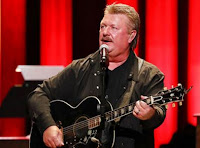I first heard of Joe by way of a quirky music video that used to play on The Nashville Network in the early 1990s. I loved the video...I've always had appreciation for songs that injected comedy or humor into their stories...and the music video for "If The Devil Danced in Empty Pockets" was certainly memorable. I wasn't aware that he'd released another hit prior to that one...but that's the song that introduced me to Joe Diffie's music. His first hit, "Home", arrived late in 1990 and it hit number one. He is one of the very few country music artists to have their major label debut single peak at the top of the chart. Joe co-wrote numerous songs and a number of them were released as singles during his career. His songwriting, in my opinion, was under-rated. I'm always finding out that he helped write songs that I'd heard for years. One of those happened to be the Holly Dunn smash hit in 1989, "There Goes My Heart Again". Joe was also a co-writer of "I'm the Only Thing I'll Hold Against You" which appeared on Conway Twitty's final studio album, Final Touches, in 1993.
In 1993 Joe Diffie became a member of the Grand Ole Opry. Some could argue that 1993 was his peak year even though none of his releases that year hit number one. It's arguable because a couple of the singles he issued that year dominated 1990's country radio and could still be heard as re-currents well into the next decade: "Honky Tonk Attitude", "John Deere Green", the mega-hit "Prop Me Up Beside the Jukebox", and in late 1993/early 1994 the ballad "In My Own Backyard". However, later on in 1994, Joe had his biggest hit single...the novelty "Pickup Man" which hit number one and remained there for four weeks. This was a follow-up to "Third Rock from the Sun" which had also hit number one. So, there you go, he had two back-to-back number one hits in 1994 and so it's arguable that 1994 was his commercial peak. In 1995 he had his last number one, "Bigger Than the Beatles".
In his career he sent 17 singles into the Top-10 of the Country charts during the years of 1990 through 2001; of those 17 singles 5 of them went to number one. In addition to those singles he also enjoyed 11 additional 'Top-40' Country hits for an overall total of 38 singles that reached that portion of the Country music chart. He sold millions of records. He had several other singles releases that peaked outside the Country Top-40 during their promotional stage and from unsolicited airplay. He was one of those artists that didn't stir the pot or rock the boat that much...controversy was really never part of his career.
His music was championed by a lot of country music fans of all age groups and even though country airplay playlists have gotten so tight over the decades, and the airplay hits dried up, Joe had a solid packed itinerary of tour dates scheduled for 2020....prior to the COVID-19 pandemic upending normalcy as we knew it causing nearly all entertainment venues to close down (the Grand Ole Opry remains open to the performers, announcers, and production assistants because of it being a weekly radio show but the public isn't allowed to attend the performances). There were so many concerts that were canceled due to the COVID-19 pandemic shutting down large gatherings of people and then the news broke on Friday that Joe tested positive for the virus...and now it's two days later and he's gone at 61.
 |
| Joe Diffie: 1958-2020 |



